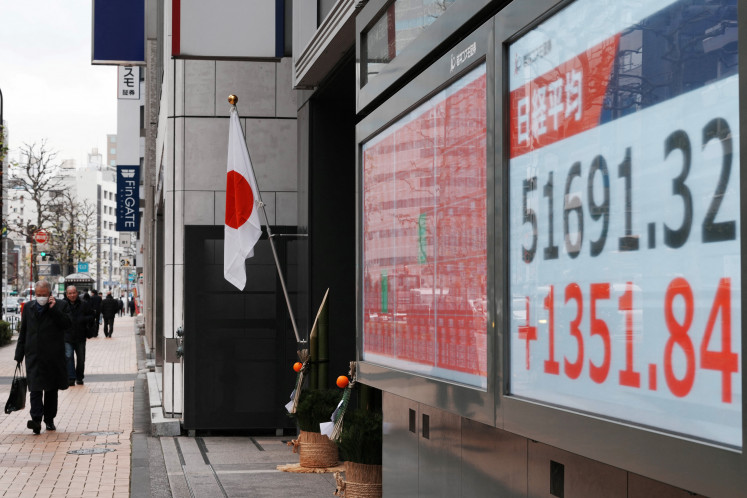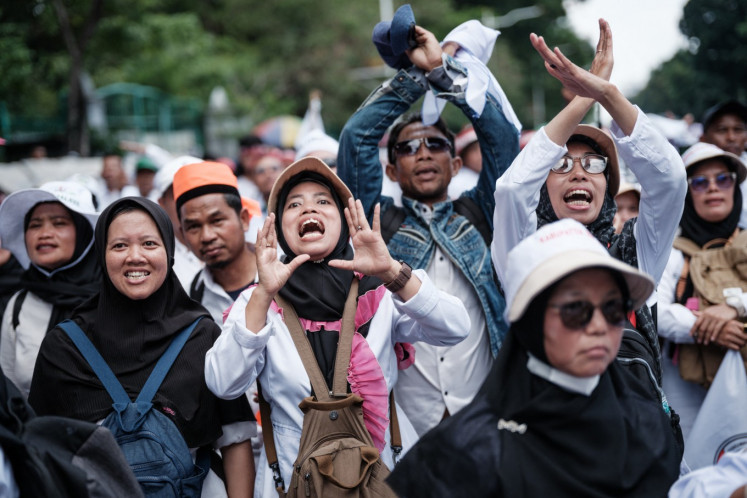Popular Reads
Top Results
Can't find what you're looking for?
View all search resultsPopular Reads
Top Results
Can't find what you're looking for?
View all search resultsImpacts of digitalization on politicking and policy-making
As the heyday of political digital marketing continues, it is important to take stock and recognize the effects of rapid digitalization on how politicians respond to the public.
Change text size
Gift Premium Articles
to Anyone
No phones at the dinner table: a well-meant rule that many of us acknowledge but struggle to stick to nowadays.
Evidently, digitalization has transformed how we interact both on a micro level between friends and family and on a macro level between different political and economic stakeholders of the state. Just this June, Prabowo Subianto’s team managed to raise almost US$20,000 through crowdfunding via the messaging app Telegram in a mere three-day period. Twitter and other social media platforms saw a hashtag war unfold between supporters of #2019GantiPresiden (#2019ChangePresident) and #Jokowi2Periode (#Jokowi2Terms) earlier this year.
As the heyday of political digital marketing continues, it is important to take stock and recognize the effects of rapid digitalization on how politicians respond to the public, to their friends and foes, and to the new policy concerns they face.
A 2018 study by the Centre for Strategic and International Studies Indonesia (CSIS) titled “RichInteractiveApplications (RIA) in Indonesia,” casts a light on this phenomena. The report unearths the economic as well as social and civic impacts of social media and communication apps through zooming in on the numbers and developing econometric models.
With the 2019 presidential election around the corner, a new term marks a new start for both the reconsolidation and redirectioning of policies. The rise of social media opens doors to greater civic participation; people are given the opportunity to express their opinions and engage in public debates. The ease and low cost of sharing information incentivize politicians to keep citizens updated with their activities too.
For example, President Joko “Jokowi” Widodo’s @jokowi account on Instagram has 10 million followers whilst Bandung mayor Ridwal Kamil has 3 million followers on Twitter. On top of these individuals, parties continue to consciously build online presence. The Indonesian Solidarity Party (PSI), set up in 2014, is one of the four new parties the General Election Commission is allowing to contest next year’s legislative and presidential elections. Focusing on the millennial demographic, which constitutes more than a quarter of the electorate, PSI relies on social media to power their growth. This strategy makes sense as a 2017 CSIS Millennials Survey found that 54.3 percent of millennials find information online everyday much higher than the 11.9 percent for non-millennials.
However, candidates emphasize online campaigns more in urban areas as the dominance of internetsurfing in daily life varies across the archipelago based on both geography and age. According to 2016 data from Susenas (Annual Socio-Economic Survey), 74 percent of social media users lived in urban areas, with particularly high densities in Java and Sumatra, whereas less than 25 percent of rural population had access to social media.
This difference reflects the gaps in economic development between different regions. The aforementioned CSIS report finds a positive association between the use of internet and social media to the economic size at the regency level. Gross Domestic Regional Product (GDRP) values of regions with 50 percent level of mobile internet penetration are 3 percent higher compared to those without internet use. Similarly, CSIS estimates that a 10 percent increase in network coverage is associated with 0.92 percent increase in GDRP growth whilst a 10 percent increase in social media penetration is associated with increased GDRP growth by 0.11 percent.
This urban-rural divide becomes increasingly worrying when a common cross-section of society repeatedly suffers in political engagement and in economic development. Policymakers worldwide are keen on ensuring that technological progress benefits all segments of society. It takes conscious effort by both the public and private sectors to achieve economic growth that works to decrease inequality, especially considering the fast pace at which technology advances. After all, digitalization comes under what has been dubbed the fourth industrial revolution or “Industry 4.0.”
Industry 4.0, very briefly, points to the milestone innovations in digital technology and the increasing role of artificial intelligence in cyber-physical decision-making systems. Joko Widodo himself has pledged to prepare five sectors to be the cornerstone for Industry 4.0: food and beverage, textiles, automotive, electronics and chemicals. He hopes these efforts will raise the competitiveness of Indonesian exports and create jobs.
On one hand, many homegrown startups and fintechs have started to ride this technological wave and generate economic activity. Tourism is also an industry that has yet to reap maximum benefits from digitalization. On the other hand, we are also soberly aware of the potential unemployment and inequality of wealth and opportunity that such change can bring. With these issues in mind, how can officials develop an agile strategy of approaching problem-solving and brainstorming solutions?
Three things to look into are crowdsourcing, reforming regulatory frameworks, and learning from the failures and successes of other countries.
First even though platforms such as LAPOR! exist, where the government facilitates complaints against public services, Indonesia has yet to fully capitalize on the talents, creativity and energy of its citizens as strategic partners in innovation. Crowd competitions, a form of crowdsourcing, can help efficiently produce actionable solutions or prototypes. For example, Challenge.gov in the United States posts challenges and gives prizes to citizens for solving them. In 2012, the Centers for Disease Control offered $35,000 to registered users of Challenge.gov to the top app, system, tool, data visualization or game developed to educate consumers on ways to prevent and treat flu.
Second, a highly supportive regulatory framework, as suggested by CSIS, is key as well. We need welldefined regulations that can help minimize damage from disruptive innovations without inhibiting them, maintain consistency with other regulations across economic sectors, and guide Indonesia to match with international best practices. These regulations need to be well communicated to all stakeholders from the outset as well.
Third, learning from countries at different stages of maturity and implementation of their own Industry 4.0 agendas may save the need for unfruitful experimentation. Among ASEAN countries, Singapore leads the pack with a comprehensive plan zeroing in on capability development, industry transformation, and reskilling workforce. Malaysia has agreements with Chinese and German entities for investments in robotics and manufacturing. In the end, perhaps staying glued to our phones from time to time might not be so bad after all if for the right reasons. We, the ordinary citizens, play a part in the big picture too.
***
The writer is an undergraduate student reading philosophy, politics and economics at the University of Oxford. She loves traveling, conversations over coffee, and working towards a meaningful career in international development. She is currently interning at the Centre for Strategic and International Studies (CSIS) Indonesia.










